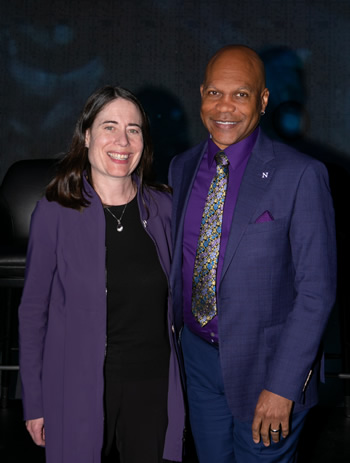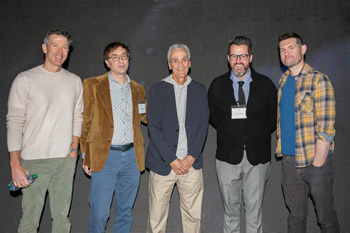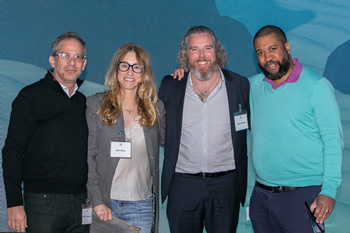Forces of Change Conference Returns to Los Angeles for a Second Year
What do The Pitt, the NFL, and Skims have in common? They were all hot topics of discussion at this year’s Forces for Change conference, which returned to Los Angeles for the second time to unite Northwestern alumni, faculty, and industry professionals in entertainment and law for a day of high-impact conversations on the shifting landscape of the creative industries.

Co-hosted by the School of Communication and the Northwestern Pritzker School of Law, the conference explored the forces—technological, cultural, and economic—reshaping how stories are made, shared, and monetized. In his welcome remarks, Dean E Patrick Johnson stated, “Today is a call to excavate the forces affecting creative change—to embrace them, critique them, and shape them. We are forces of change. We create new rules.”
Dean Hari Osofsky of Northwestern Law emphasized the University’s continued investment in interdisciplinary training and cross-coastal programming. The announcement of a new West Coast initiative in entertainment law underscored that mission, with law and communication students in attendance reflecting the schools’ growing presence in the industry.
This year’s programming centered on the convergence of three disruptive forces: the rise of artificial intelligence, the continued evolution of streaming platforms, and the growing influence of creators and celebrities as independent media powerhouses. Through four panels populated with Northwestern alumni, faculty, and industry changemakers, attendees engaged in thoughtful dialogue about what these shifts mean for the future of content and the people who create it. Held at the new, immersive, and innovative COSM Center, attendees basked in the glow of a three-story tall IMAX screen projecting snippets of world wonders, faraway lands, and of course, the Northwestern emblem.
Felicia D. Henderson, associate professor of radio/television/film (RTVF) and a television writer and producer known for her work on Soul Food and Fringe, opened the first panel with a question about the state of streaming. Joined by producer and director Bill Bindley (C84), Netflix’s Nicki Jaeger (LAW98), Fox Entertainment’s Allison Wallach (C90), and Variety editor Michael Schneider (MDL95), the panel unpacked the ways streaming continues to reconfigure industry expectations.

Bindley recalled the development of The Last Summer, a film he co-wrote with his brother that ultimately bypassed theatrical release for a global debut on Netflix. “We were always taught to measure success by box office,” Bindley said. “But on Netflix, it hit 47 million accounts. That would’ve been maybe, $400 million in ticket sales.” The experience prompted a strategic pivot at his company, Gulfstream Pictures, which now develops projects with a streaming-first approach.
Jaeger and Wallach both addressed the growing complexity of dealmaking in the current landscape. While the streaming model initially offered straightforward buyouts, they noted a return to more traditional structures that prioritize creator ownership, live television, and weekly procedurals like The Pitt, a frequent reference during the day. “The pendulum is swinging back,” Wallach said.
Throughout the day, speakers returned to the topic of power—where it comes from, how it shifts, and who wields it. In the age of influencers and decentralized platforms, that conversation often starts with the creators themselves.
The conversation continued with a second panel, AI in Entertainment: Creative Challenges and Business Opportunities. Moderated by Lauren Fried (LAW2013) (Loeb & Loeb), the panel explored the creative and legal implications of generative AI. Panelists included Viren Tellis (KSM13) (Uthana), Lauren McCarthy (GC21) (Cineverse), tech entrepreneur Adam Rowings (C07), and RTVF professor, department chair, and playwright Thomas Bradshaw.

Fried began with a case study from her own work: Ava, an AI chatbot developed to recommend streaming content and help studios tailor marketing strategies. “Ava doesn’t work without human input,” she said. “It’s about enhancing creativity, not replacing it.”
Tellis described how his company’s AI tool learns the distinctive styles of individual animators to generate 3D scenes more efficiently. “We’re lowering the barrier to entry,” he explained. “Now, small studios can do what only the big ones used to.”
Bradshaw and McCarthy both raised concerns about automation replacing artists and emphasized the need for ethical standards. “We have to preserve the human in storytelling,” McCarthy said, warning that “AI is only as good as the data and ethics behind it.”
Environmental concerns, labor issues, and regulatory gaps also surfaced in the discussion, with agreement among panelists that the next generation of creators must be involved in shaping policy—not just content.
The final panel, Celebrity Entrepreneurship and Social Media Influencers, explored how fame and digital culture intersect in today’s entertainment economy. Moderated by John Kulback (Loeb & Loeb), the panel featured Chris Thorne (LAW06, KSM06) (Beats by Dre), Allen Shapiro (Celebrands), actor and writer Billy Eichner (C00), and assistant professor of RTVF and screenwriter Brett Neveu.
Eichner traced his trajectory from Northwestern theatre student to viral comedian. “Billy on the Street started as a live show,” he said. “But YouTube changed everything. Without it, I wouldn’t have a career.” He reflected on the complexity of creating personal work in a public, algorithm-driven space: “There’s pressure to be a brand, but I still think like an artist.”

Thorne emphasized that celebrity-led brands work best when rooted in authenticity. “They’re the shortcut to consumer attention,” he said. “The celebrity needs to be qualified to be the expert,” in reference to his Skims collaboration with Kim Kardashian. “You need the right match between voice and product.”
Neveu emphasized persistence, relationships, and execution. “Nothing happens unless I write it,” he said. “You’ve got to be your own champion.”
In the closing session, Deans Johnson and Osofsky returned to the stage for a candid conversation with Jeff Jacobs (C85, MSJ87) (CAA) and David Rone (Guggenheim Partners), both of whom offered reflections on how the industry continues to evolve—and why curiosity remains essential.
“We’re in a golden age of content,” Rone said. “There’s more room than ever for great storytelling.” Jacobs, marking his 40th reunion year, encouraged the next generation to lead without fear. “Don’t be afraid of the new. Embrace the disruption.”
Samah Meghjee is a Los Angeles-based writer and 2022 graduate of the MFA in Writing for Screen and Stage program in the School of Communication.
